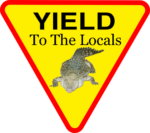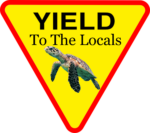The American crocodiles (Crocodylus acutus), a species often shrouded in myth and misunderstanding, is a fascinating and integral part of the Florida Keys ecosystem. This ancient reptile, with its distinctive, narrow snout and elongated body, has inhabited these subtropical islands for centuries. Despite its fearsome appearance, the American crocodile is generally docile and plays a vital role in maintaining the delicate balance of the local environment.
A Brief History
The American crocodile’s presence in the Florida Keys dates back millennia. Fossil evidence suggests that these reptiles have inhabited the region for at least 10,000 years. However, human activities, including habitat destruction, hunting, and pollution, have significantly reduced their populations over the centuries. In the 1970s, the American crocodile was listed as endangered in the United States. Thanks to conservation efforts, including the establishment of protected areas and captive breeding programs, their numbers have rebounded in recent years.
Biology and Physical Characteristics
American crocodiles are the largest reptiles in North America. Adult males can reach lengths of up to 20 feet (6 meters) and weigh over 1,000 pounds (450 kilograms). Their bodies are well-adapted for aquatic life, with streamlined shapes, powerful tails, and webbed feet. Their skin is thick and tough, providing protection from predators and the harsh marine environment. The American crocodile’s most distinctive feature is its long, narrow snout, which is well-suited for catching fish and other small aquatic prey.
Lifestyle and Behavior
American crocodiles are primarily solitary animals, coming together only to mate or defend their territories. They are highly adaptable and can be found in a variety of habitats, including coastal marshes, mangrove forests, and freshwater rivers. These reptiles are excellent swimmers and can remain submerged for long periods. They are primarily carnivorous, feeding on a diet that includes fish, birds, turtles, and small mammals.
Living With The American Crocodile
Despite their fearsome appearance, American crocodiles are generally docile and avoid confrontations with humans. However, it is important to remember that these animals are wild and can be dangerous if provoked. To ensure safety, it is essential to follow guidelines established by local authorities, such as maintaining a safe distance from crocodiles and avoiding feeding them.
Cohabiting Safely with American Crocodiles
Living in the Florida Keys often means sharing the landscape with American crocodiles. Here are some tips for cohabiting safely with these ancient reptiles:
- Maintain a safe distance: Never approach or attempt to touch a crocodile. A safe distance is generally considered to be at least 25 feet (7.6 meters).
- Avoid feeding crocodiles: Feeding crocodiles can lead to aggressive behavior and can also pose a risk to human health.
- Be aware of your surroundings: Pay attention to your surroundings, especially when walking or swimming in areas where crocodiles are known to inhabit.
- Secure trash and food scraps: Keep trash and food scraps securely stored to avoid attracting crocodiles.
- Do not swim in areas where crocodiles are present: Swimming in areas where crocodiles are known to inhabit can be dangerous.
- Report any aggressive or injured crocodiles: If you encounter an aggressive or injured crocodile, report the incident to local authorities.
Conservation Efforts
Dry Tortugas American Crocodile Relocated to Everglades
The American crocodile is a protected species in the United States, and numerous conservation efforts are underway to ensure its survival. These efforts include habitat restoration, captive breeding programs, and public education initiatives. By understanding and respecting these ancient reptiles, we can help to protect their populations and ensure their continued presence in the Florida Keys for generations to come.
By Gemini
These Keys Treasures Designs and many more are available on products such as T-Shirts, Sweats, Hoodies, much more at KeysTreasures on Amazon.



